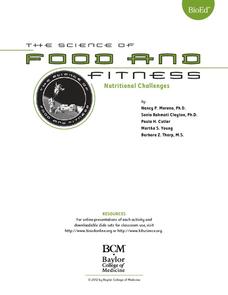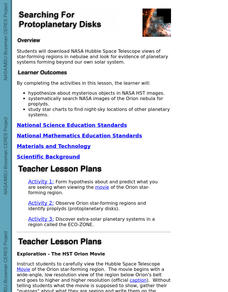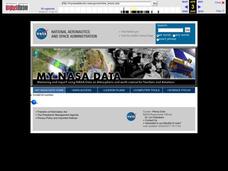Teach Engineering
Copycat Engineers
It's often said that imitation is the sincerest form of flattery. Young engineers learn about biomimicry, which uses nature to generate engineering ideas, in the fifth lesson of nine in a Life Science unit. Working in groups, they select...
National Woman's History Museum
Inventive Women - Part 1
While a woman didn't invent the parasol, three women received patents for their improvements to the original design of umbrellas. In the first of a two-part series on inventive women, class members investigate the patent system to...
BioEd Online
Nutritional Challenges
Eating healthy can be a challenge, especially for people with special dietary needs. After learning about standard nutritional needs for adults, learners take on the role of a dietician and work together to create a menu for one of the...
NPR
This Isn't Right: A History of Women in Industry
Women were in the workplace long before Rosie the Riveter pushed up her sleeve. Learn about the working options available to women during the Industrial Revolution, the Progressive Era, and the Great Depression with a lesson that prompts...
Curated OER
Discover Magazine: The Solar System
Students research ideas for NASA's space exploration. In this Space Science lesson plan, students will try to find a way to bring NASA back into the spot light. Students will presented their ideas to the class for review.
Curated OER
Mission Impossible! Are We Alone in the Universe, or Are We Just One of Its Citizens?
Students examine NASA strategy for scientifically studying any celestial body. They brainstorm about all previous space explorations and missions they can recall, and propose an expedition plan to become space explorers of the future.
Curated OER
Searching For Protoplanetary Disks
Young scholars download NASA Hubble Space Telescope views of star-forming regions in nebulae and look for evidence of planetary systems forming beyond our own solar system. They hypothesize about mysterious objects in NASA HST images.
Curated OER
Life Beyond Earth
Students investigate the solar system and what makes a planet habitable. They complete an online Webquest, simulate a NASA training program online, take an online quiz, answer discussion questions, and locate newspaper articles about the...
Curated OER
Cloud Poems
First graders make daily observations about clouds, write in their cloud books, make cloud charts, and make a poem about clouds.
Curated OER
Being Nosy About Our Neighbors
Students use the scientific method to explore the effect of size on impact cratering. They compare images of landforms on Earth to those of other planets to compare surface processes. Students infer the geologic history of another...
Curated OER
Design Challenge
Students plan, design, construct, and implement an informational display about the International Space Station in small groups.
Curated OER
Seasonal Cloud Cover Variations
Students, in groups, access data from the NASA website Live Access Server regarding seasonal cloud coverage and the type of clouds that make up the coverage. They graph the data and make correlations between types, seasons and percentages.
Curated OER
How Much Water Is Available In The Atmosphere For Precipitation?
Learners explore the relationship between the available water in the atmosphere and how it is portrayed on satellites. After examining global moisture and precipitation students research precipitation data graph the results. Using their...
NASA
Geographical Influences
"If global warming is real, why is it so cold?" Distinguishing the difference between weather and climate is important when it comes to understanding our planet. In these activities, young scientists look at the climate patterns in a...
Chicago Botanic Garden
Recent Weather Patterns
Decide whether weather is changing! A two-part activity first challenges classes to review the differences between weather and climate. Once finished, individuals then analyze historical data to determine if climate change is happening...
National Center for Case Study Teaching in Science
To Boldly Go, or Not
Here is a different way to combine social studies and science. Have your high schoolers read a passage about the 2004 vision for space exploration and then discuss the practicality, costs, and reasons for returning to the moon. Then, the...
Curated OER
Explosive Ideas: Oregon quarter reverse
Explore Earth and her amazing layers with this lesson on planetary change. Students will research the ways in which Earth's layers cause change. They will complete a "Tectonic Puzzle" and use a worksheet to answer questions about Earth's...
Curated OER
What Would You Fly?
Students, after reading an explanation from a NASA Web site, demonstrate an understanding of the text by writing an essay that applies the information found in the slides to a real-life question.
Curated OER
Exploration of Mars
Students explore the three-phase strategy used by NASA for scientific exploration. In this space science lesson, students research past missions to Mars. They share their discoveries and create a timeline as a class.
Curated OER
Eyes in the Sky
Students complete a unit on orbiting spacecraft designed to study astronomical objects. They conduct Internet research on NASA missions, use a satellite dish to downlink information, and construct and launch a rocket out of paper and tape.
Chicago Botanic Garden
Personal Choices and the Planet
How big is your footprint? Activity three culminates the series by having groups complete carbon footprint audits with people in their schools and/or around the districts. Groups then gather their data, create a presentation including...
Chicago Botanic Garden
Preparing for Project BudBurst
Male deer growing antlers to begin the breeding season is an example of a phenological event. First in a four-part series is an activity requiring individuals to collect phenological data on their campus. Classes discuss phenology, the...
National Wildlife Federation
I’ve Got the POWER! Solar Energy Potential at Your School
Should every school have solar panels? The 19th lesson in a series of 21 has scholars research the feasibility of using solar panels at their school. They begin by gathering data on the solar energy in the area before estimating the...
National Wildlife Federation
Ghost Town
Around 93 percent of the reefs on Australia's Great Barrier Reef have been bleached, and almost one quarter of them are now dead. Scholars research the sea temperatures, especially around the areas with coral reefs, to make connections...

























